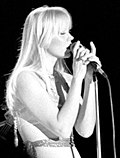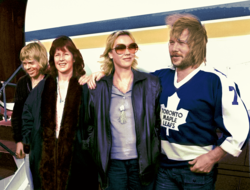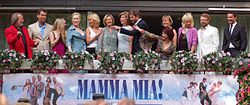ABBA
ABBA is a Swedish pop music group, who had many hits in the 1970s in Stockholm and early 1980s. ABBA is the most successful Swedish music group of all time and was the most commercially successful pop group of the 1970s.[1]
ABBA | |
|---|---|
 ABBA in 1974; from left to right Benny Andersson, Anni-Frid Lyngstad, Agnetha Fältskog, Björn Ulvaeus | |
| Background information | |
| Also known as | Agnetha Benny Björn Anni-Frid |
| Origin | Stockholm, Sweden |
| Genres | Pop rock, Euro disco, Europop, synthpop |
| Years active | 1972 – 1982; 2018 - present |
| Labels | Polar, Polydor, Atlantic, Universal, Epic, Vogue, RCA, PolyGram, Sunshine |
| Associated acts | Hep Stars, Hootenanny Singers, Benny Anderssons Orkester |
| Website | abbasite |
| Members | Agnetha "Anna" Fältskog Björn Ulvaeus Benny Andersson Anni-Frid "Frida" Lyngstad |
ABBA became very popular after they won the Eurovision Song Contest in 1974. They had many hits. These included "Dancing Queen", "SOS", "Money, Money, Money", "Mamma Mia", and "Waterloo". Most of their songs were written by Ulvaeus and Andersson.
They originally broke up in 1982, but their music is still popular. It has appeared in movies (including the Australian movies The Adventures of Priscilla, Queen of the Desert and Muriel's Wedding). The stage musical Mamma Mia! was developed from their music and subsequently made into a 2008 movie followed ten years later by a 2018 sequel Mamma Mia! Here We Go Again.
Name
The name "ABBA" is made from the first letter of each member's first name:
History
Formation and naming
All four ABBA members had local music careers before ABBA even formed. Frida and Agnetha were both solo singers. Benny and Bjorn both had their own individual bands. In 1966, Benny and Bjorn both met and decided to write songs together. In 1969, Bjorn met Agnetha and Benny met Frida. All four friends met together and decided to work together to record songs.
By 1970, they were known as "Bjorn & Benny (With Svenska Flicka)".[2][3] Later they were called Bjorn & Benny, Agnetha & Frida. Their first hit was a song called "Hej, gamle man".[4] By 1971, Bjorn and Agnetha were married and Benny and Frida were engaged. It wasn't until 1973 that the group became officially known as ABBA. The name was suggested by their manager, Stig Anderson.
Melodifestivalen and Eurovision
"Ring Ring" in 1973 was when the group achieved success throughout much of Europe and Africa. They entered the Swedish song contest Melodifestivalen in 1973 and finished in third place. They returned to Melodifestivalen the next year with "Waterloo" and won. This gave them the chance to perform in the Eurovision Song Contest. With "Waterloo", they won and soon got global success.
Global career
In 1976, ABBA released "Dancing Queen", which is often known as ABBA's "signature song" and "one of the greatest pop songs ever written".[5][6] During 1977, their huge popularity became known as "Abbamania".[7] In Australia, ABBA played in huge concerts that usually always sold out.[8] "ABBA: The Movie" was also released in 1977 during the height of the group's popularity. Throughout the mid and late 1970's ABBA performed in Europe, The United States, Japan and Australia.[9]
In early 1979, Agnetha and Bjorn divorced. In early 1981, Frida and Benny also got divorced. This led to many sadder and more mature songs over the next few years.[10] By 1981, ABBA's popularity was declining. Their last album, "The Visitors" a not a big success like previous albums.[11] "The Day Before You Came" was the last song ABBA ever recorded together, while "Under Attack" was the last song ever released, both in 1982.[12] ABBA broke up shortly before 1983 and all members continued on their independent music careers, just like before they had met.[13]
Legacy
Even though they split up, they have remained very popular and many of their songs are still listened to by many people. The musical and movie Mamma Mia! was made, which is a story featuring ABBA's main songs. Ulvaeus and Anderson both appear in the movie. Ulvaeus also made an appearance on video at the Eurovision Song Contest 2023. Due to Sweden's win at Eurovision 2023, the next contest will be hosted in Sweden and also marks the celebration of 50 years since ABBA won.
In addition, in 2022, a concert in London opened named ABBA Voyage. People can go to watch virtual avatars of ABBA performing.
Albums
ABBA recorded eight albums between 1973 and 1981,[14] as well as some compilation albums.
- Ring Ring (1973)
- Waterloo (1974)
- ABBA (1975)
- Arrival (1977)
- ABBA: The Album (1977)
- Voulez-Vous (1979)
- Super Trouper (1980)
- The Visitors (1981)
- Voyage (2021)
Famous hit songs
- Waterloo (1974)
- Mamma Mia (1975)
- Fernando (1976)
- Dancing Queen (1976)
- Money Money Money (1976)
- Take a Chance on Me (1977)
- Chiquitita (1978)
- Gimme Gimme Gimme (1979)
- The Winner Takes It All (1980)
Other songs
- People Need Love (1972)
- Another Town, Another Train (1973)
- Honey Honey (1974)
- So Long (1974)
- I Do, I Do, I Do, I Do, I Do (1974)
- SOS (1975)
- Hey, Hey, Helen (1975)
- That's Me (1976)
- Dum Dum Diddle (1976)
- Knowing Me, Knowing You (1977)
- The Name of the Game (1977)
- Eagle (1977)
- Hole in Your Soul (1977)
- Summer Night City (1978)
- Does Your Mother Know (1979)
- Kisses of Fire (1979)
- I Have A Dream (1979)
- Happy New Year (1980)
- Me And I (1980)
- Lay All Your Love On Me (1980)
- One Of Us (1981)
- When All Is Said And Done (1981)
- Cassandra (1982)
- Under Attack (1982)
- The Day Before You Came (1982)
- I Still Have Faith in You (2018)
- Don’t Shut Me Down (2018)
ABBA Media
This well-known ambigram logo for ABBA was designed by Rune Söderqvist in 1976.
Agnetha Fältskog at the opening concert of ABBA's European and Australian Tour in Oslo, 28 January 1977
Posing together with the actors from the motion picture Mamma Mia! The Movie on 4 July 2008, are the original ABBA members. Far left, Benny Andersson. Fifth from left, Agnetha Fältskog, with her hand on Anni-Frid Lyngstad's shoulder. Second from right, Björn Ulvaeus.
References
- ↑ "ABBA Music News & Info". billboard.com. 2012. Archived from the original on 11 September 2011. Retrieved 15 March 2012.
- ↑ Meaning "Bjorn & Benny (With Swedish Girls)
- ↑ "Björn & Benny (With Svenska Flicka)* / Björn & Benny* - People Need Love / Merry-Go-Round". Discogs.
- ↑ Meaning "Hey, old man".
- ↑ Songfacts. "Dancing Queen by ABBA - Songfacts". www.songfacts.com.
- ↑ "ABBA: 5 best song lyrics or verses". AXS.
- ↑ "Abbamania Australia | ᗅᗺᗷᗅOfficial.com News Blog". Archived from the original on 2015-07-06. Retrieved 2015-11-04.
- ↑ Inc, Nielsen Business Media (8 September 1979). "Billboard". Nielsen Business Media, Inc. – via Google Books.
{{cite web}}:|last=has generic name (help) - ↑ "ABBA IN JAPAN - ᗅᗺᗷᗅOFFICIAL.COM NEWS BLOG".
- ↑ "Why I loved singing about the pain of my divorce - by Abba's Agnetha". Mail Online. 5 May 2013.
- ↑ "The Visitors - ABBA - Songs, Reviews, Credits". AllMusic.
- ↑ Sheridan, Simon (2012). The Complete ABBA (40th Anniversary Edition). Titan Books (US, CA). p. 319. ISBN 978-1-78116-498-3.
- ↑ Palm, Carl Magnus (2014). Abba: Bright Lights Dark Shadows. Omnibus Press. p. 738. ISBN 978-1-78323-049-5.
- ↑ "ABBA Albums, Discography". billboard.com. 2012. Archived from the original on 11 September 2011. Retrieved 15 March 2012.
Other websites
| Wikimedia Commons has media related to Lua error in Module:Commons_link at line 62: attempt to index field 'wikibase' (a nil value).. |









